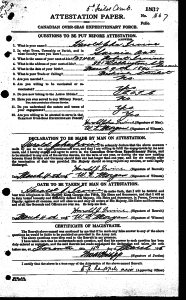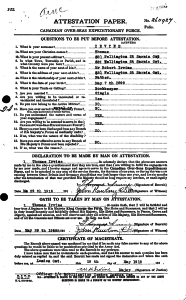Sarnia
Sarnia
The First World War
Harold John (Doc) Irvine |
|
Harold served briefly in the fledgling Canadian Air Force at its creation in 1921 – h e took a short-term posting to Camp Borden to set up medical facilities, and is believed to be the first MO in the air force. Harold settled in Brigden with his family until 1939, when he was called back to active service and promoted to Major. Harold was posted to the 12th Basic Training Centre in Chatham, Ontario as chief medical officer (MO1), and was later posted to Petawawa. It was in Petawawa in 1945 that he suffered his first major heart attack, which resulted in his being discharged from the army. In light of his training and his service, he was offered a position at Parkwood Veterans Hospital in London, a post he held until his death in 1957. ~ Story told by David Irvine, Forest, grandson of Harold Irvine |
Thomas Irvine |
|
T ~ Story told by David Irvine, Forest |
Charles William Lynn |
|
On September 21st 1915, Charles Lynn signed up with the 70th Overseas Battalion, Canadian Expeditionary Forces. He listed his father as Mr. George Lynn, Jubilee Cottage, Wesley, Somersetshire, England. Charles sailed from Halifax on the S. S. Lapland on April 24th, 1916 and arrived in Liverpool on May 5th, 1916. He was transferred to the 39th Battalion on October 7, 1916 and drafted to the 18th Battalion and fought in France. He was discharged on 26 August 1919 at Halifax. ~Story told by Janet Kelch of Sarnia, Charles's granddaughter. |
Thomas Gleeson |
|
“My Grandfather, Thomas Gleeson was born outside the Petrolia and Oil Springs area in 1895. The corner that was adjacent to their farm was known locally as Killarny Corners as the owner of the store was from Killarny Ireland. He had 12 brothers, however at the time he joined the army the family had moved to Sarnia at 330 Queen Street. He worked for Imperial Oil both before and after the war. Thomas served with “B” company 1st Depot Battalion, Western Ontario Regiment of the Canadian Expeditionary Force. He was 22 years 8 months old when he enlisted. The brothers, in the army, all ended up in France. Great Uncle Pat told me a story at my Grandfathers funeral and it went like this. Great Uncle Pat's group were sent to a staging area where many Canadian troops were billeted in tents of course, he said it was a huge tent city. He was walking along the rows of tents when he stumbled on to his brother, my Grandfather. They had not seen each other in many months so it was a joyous occasion. It was further enjoyed when my Great Uncle Pat informed my Grandfather that he knew where another brother was, so of course they went to see him. Well, as he told me, they got together at a cafe or something and there were a group of American soldiers basically harassing some local French women. The boys from Petrolia advised their American cousins that all women are ladies and should be treated as such. Well, he said, “the fight was on and the Americans learned their lesson.” That is the only story I ever heard of my Grandfather during the war. He died in 1970.” ~Story told by Gerry Bezaire of Grand Bend, Thomas's |


 Harold Irvine was the older of two sons born to Robert and Mary Irvine of Sarnia. Harold, along with his brother Tom, enlisted in the 5th Field Ambulance, Royal Canadian Army Medical Corps in March of 1915 and was sent to France. At the time of his enlistment, Harold was attending the University of Toronto studying medicine. It was clear that the CEF was going to need lots of doctors, and as a result, Harold was discharged in 1916 to return to Canada to complete his medical training. Graduating from U of T in 1917, Harold re-entered the Medical Corps as a doctor with the rank of Captain. As luck would have it, rather than returning to France, Harold was posted to the British garrison in St. Lucia as senior medical officer. He remained in that posting until 1919, when he returned to Canada.
Harold Irvine was the older of two sons born to Robert and Mary Irvine of Sarnia. Harold, along with his brother Tom, enlisted in the 5th Field Ambulance, Royal Canadian Army Medical Corps in March of 1915 and was sent to France. At the time of his enlistment, Harold was attending the University of Toronto studying medicine. It was clear that the CEF was going to need lots of doctors, and as a result, Harold was discharged in 1916 to return to Canada to complete his medical training. Graduating from U of T in 1917, Harold re-entered the Medical Corps as a doctor with the rank of Captain. As luck would have it, rather than returning to France, Harold was posted to the British garrison in St. Lucia as senior medical officer. He remained in that posting until 1919, when he returned to Canada. homas followed his older brother Harold into the Canadian Expeditionary Force, specifically the Medical Corps, in May of 1918, following his 18th birthday. Thomas was one of the Canadians who were transferred to Russia in 1918 in support of the anti-Bolshevik, or White Russian forces. Family legend has it that Tom was one of a number of Canadian soldiers who escaped Russia by seizing a train and taking it to Vladivostok, where they commandeered a ship for the voyage home. He returned to Canada in 1919.
homas followed his older brother Harold into the Canadian Expeditionary Force, specifically the Medical Corps, in May of 1918, following his 18th birthday. Thomas was one of the Canadians who were transferred to Russia in 1918 in support of the anti-Bolshevik, or White Russian forces. Family legend has it that Tom was one of a number of Canadian soldiers who escaped Russia by seizing a train and taking it to Vladivostok, where they commandeered a ship for the voyage home. He returned to Canada in 1919. Subscribe to this page
Subscribe to this page